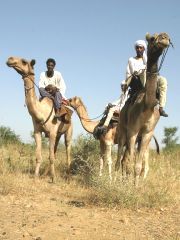Sudan insists on trying Darfur suspects at home as US diplomat visits
KHARTOUM, March 1 (AFP) — Sudan reiterated Tuesday that those suspected of committing human rights abuses in the troubled western region of Darfur should be tried by its own courts, as a top US diplomat started a visit to the country.

|
|
Members of the Um Jalool, an Arab nomadic tribe alleged to be part of the Janjaweed militia, ride their camels 20 kilometers outside the village of Muhkjar in West Darfur, October 2004. (HRW). |
To put on trial “any Sudanese abroad is out of the question and impossible”, said Foreign Minister Mustafa Osman Ismail.
A UN commission issued a report in January blaming Khartoum and pro-government militias for the killing of civilians, torture, enforced disappearances, destruction of villages, rape, pillaging and forced displacement throughout Darfur.
It also identified 51 individuals whom the report accused of complicity in the crimes and recommended that suspects be referred to the international Criminal Court (ICC) in The Hague.
And last month, the United Nations high commissioner for human rights, Louise Arbour, said the tribunal was the best option for ending the violence in the war-torn Darfur region and of bringing rights violators to justice.
But Ismail insisted the suspects “will be tried inside the Sudan and by the Sudanese judiciary”, saying he was “confident in the competence” of the country’s legal system and courts.
At least 70,000 people have died after two years of fighting in Darfur, where the government and its proxy militias have brutally put down a rebellion launched in February 2003.
Ismail’s comments coincided with the arrival in Khartoum of Charles Snyder, the US State Department’s senior representative on Sudan.
Washington has labeled the violence in Darfur as genocide, but it favors other means to bring suspected Darfur war criminals to justice, including the use of the International Criminal Tribunal set up in Tanzania to try Rwanda genocide suspects.
Ismail and Synder were due to hold talks Wednesday on several issues, including the situation in Darfur as well as implementation of a January 9 peace agreement which ended a two-decade-old civil war between northern and southern Sudan.
